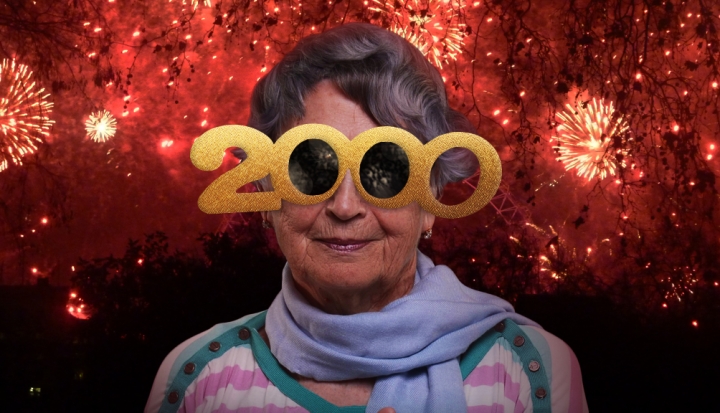By Tom McGrath
This article appeared in the January 1999 issue of U.S. Catholic (Vol. 64, No. 1, pages 27-31).
Should the church make a big deal out of the millennium? I’m of two minds about that. Perhaps the following two stories can capture the split frame of mind I have as to whether we should go all out in celebration or if the millennium is much ado about nothing.
The first story stars Saint Francis of Assisi. A traveling pilgrim saw Saint Francis working in his garden, hoeing a row of beans. The traveler, a spiritual seeker, asked the saint, “What would you be doing right now if you knew this was the last day of your earthly life?”
Saint Francis replied, “I would continue hoeing this row of beans.” And he proceeded to do just that.
This story aptly exemplifies a basic spiritual practice principle: that you should always be where you are and do what you’re doing. Don’t live in the future, don’t dwell in the past. The kingdom of God is at hand—in a row of beans, the pile of office work, the baby in need of changing, the neighbor in need of a ride to a doctor’s appointment. Don’t go looking for some magic moment or special event to signal that real life or holiness has begun.
The second story happened when I was about 9 years old, riding in the back seat of a ’54 Ford. My parents, my older brother, and I were on the highway to Gettysburg, Pennsylvania. Though we were on a much-anticipated family vacation, the thrill of the open road had worn off way back near the Illinois/Indiana border.
But something captured our attention. Someone pointed out that the odometer was within a dozen miles of hitting the 99,999.9 mark. So I leaned over the front seat to watch the car’s odometer grind its way toward that magic number 100,000. Though it would be just another ordinary moment on our long trip, this flipping of the odometer seemed special. Somehow it seemed to symbolize all the miles we’d driven prior to that moment and pointed to the other miles we’d drive, together and separately, in years to come.
While we watched the odometer inch forward, we talked about the places we’d been in this car: Sunday trips to Cedar Lake, trips to Comiskey Park for White Sox games, over to Grandma’s for Thanksgiving, trips to cousins’ houses, to Sears for Christmas shopping, to accordion lessons (hey, it was the ‘50s!), to Dad’s office, to visit relatives in the hospital, and on and on. Even the memory of running mundane errands took on a special glow as the odometer neared this benchmark.
God knows, the odometer on that old beater of a car was most likely miscalibrated. So the “big flip” probably wouldn’t coincide with the actual 100,000th mile this car had traveled. That didn’t matter. What mattered was the gathering of memories, the reflection on our life together, the taking stock of the course we’d been on, and the hopes engendered for the journeys to come.
And so I’m stuck vacillating between two thoughts about how and whether to celebrate the arrival of the new millennium. From one point of view, the changing of the calendar from 1999 to 2000 is a nonevent, an arbitrary moment, a thin slice of time no different from the day before or the day after. And yet, what human beings find in this moment and the opportunity it affords us: to discover God’s handiwork in our past, find a solid hope for the future, and see reasons to rejoice in the present.
Upon further reflection I can see that both stories have a single point: stay awake! Be alert and aware of where you are and what’s truly happening. And so the question becomes not whether we should celebrate this flipping of the calendar, but how best to do that.
I guess what I worry about is that too often there’s a lack of attunement between what church leaders proclaim and people’s real experience. I’ve heard too many sermons that being, “Today we come to worship filled with anticipation as the church moves out of ordinary time and into a new church year.” Meanwhile, people sit in their pews worrying about tuition bills, insecurities on the job, childcare woes, or the argument they just had with their daughter who’s off in California.
How should we proceed? Maybe there are some clues in these two stories to guide us. The first is that we should begin by paying attention to what’s true for us now, here, this minute. Like Saint Francis, let’s pay attention to the row we’re hoeing. Stop and ask, “How is God’s love at work in my life today?” As individuals, as families, as local communities we can begin by being still long enough to recognize the hand of God in the events of our lives today. Rather than sleepwalking through life, let’s be awake and aware of the presence of God.
Some of us may need practice at becoming attuned to the Spirit at work in our lives. Shared reflections is a good way to foster such awareness, and so I recommend that people form faith-sharing groups. Listening to others describe how God is active in their life always helps me see God’s handiwork in my own life.
Another block to awareness is the busyness that so many people experience in their lives. For those who feel constantly overworked, I recommend significantly cutting back on the amount of activities in your life—no matter how worthwhile they may be—in order to make time to listen and attend to God’s presence. Look at a typical week and pick one activity or habit to discard and don’t fill that time up with other distractions. Use it to just be. As a quiet time of reflection and awareness. Sit and look at God, and be aware that God is looking at you.
Another important step in preparing for the millennium is remembering. Just as my family spent our waiting time thinking back on all the places we’d been in our old car, call to mind the ways we all have been on the journey with Christ. As individuals, as parishes, as a universal church, we need to call to mind all that we’ve done—and all that we’ve failed to do—in carrying out the mission of Jesus to the world. Surely there will be many times we’ve fallen short. Pope John Paul II has realized this and has publicly apologized for sins of the past: for bias against women, for oppressing rather than choosing the path of love, for failure to act with courage when others were oppressed.
And yet how much good has been done by fellow Catholics over the past two millennia. Think of all the meals fed to the hungry, the wounds bandaged, the care given to the desperate, the beds provided for children who were abandoned. Think of Catholic Charities and the Catholic Campaign for Human Development. Think of heroes down the ages such as Mother Frances Xavier Cabrini, Saint Vincent de Paul, Saint Martain de Porres, Dorothy Day. We need to look at our history squarely—warts and all—and embrace it.
Finally, we need to enlist the talents of the artists among us to help us craft celebrations that are grounded in our awareness of the grace of today, the treasure of yesterday and the promise of tomorrow. We need to let these artists loose the fashion for us celebrations worthy of the truth we’ve come to know. We need to do this at the local parish level, but even more so I hope we can do this at the universal level. In this time of great international strife, ethnic warfare, and the splintering of peace, wouldn’t it be great to have a symbolic action that would unite people from every nation, race, and continent to celebrate the truth that God is love, and those who abide in love, abide in God?
Should it be a Mass? Could we all—1 billion Catholics, or better yet, 2 billion Christians around the world—choose a time to say the Our Father together? How about a song, like the Gloria? Or a moment of silence while bells peel around the globe?
We should put some talent and energy into this. Wouldn’t it be sad if we were outdone by Disney, the NFL, and Yanni? As we prepare we need an artist, not a teacher. We need a Michelangelo of the moment who will be in tune with the times and also help us all to transcend the bounds of space and time to glimpse the true meaning of why we’re here.
Catholics are a sacramental people. We believe that we meet God in natural things and events: a sunrise, a gesture of kindness, a shared meal, a celebration. Yet we must pay attention in today’s moment in order to be aware of God’s presence all around us. And that, I suppose, is why the pope has called us to prepare for the flipping of the calendar a year from now. What we are being called to do is to look at our own lives and recognize God’s presence yesterday, today, and always. That seems worth celebrating.













Add comment